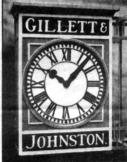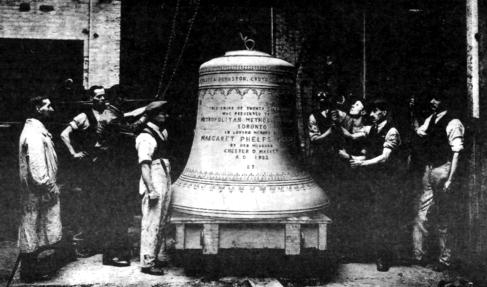For Whom The Bell Tolls
The reputation of Gillett and Johnstone carried Croydon all over the globe where their bells were in demand, not just in parish churches and public buildings in the UK, but for some of the world's international landmarks.
Originally a clock making business, it was the making and selling of bells which catapulted the small, local business into the international arena.

William Gillett moved his clock making business to Whitehorse Road in 1844, although this address would later change to Union Road, expanding to include bell founding in 1877 when Arthur Johnstone became a partner. By 1868 the foundry was one of the first steam powered clock factories in the world and a clock tower was added to the works as a working advertisement.
Between 1844 and 1950, more than 14,000 town hall clocks were made at the foundry.
William Johnston's son Cyril joined the business in 1903 and took it over after his father's death in 1916.
Cyril Johnston is credited as the man who rediscovered the art of bell tuning, an art form which had been lost for more than 200 years, and made the name of Gillett and Johnston synonomous with bells and world.
Trained in the business for many years, Cyril Johnston perfected the technique of tuning bells and his method was widely acknowledged to be the best in the world.
The success of Gillett and Johnston was never more pronounced than its heyday during the 1920s and early 1930s where the bell making side of the business grew to meet international demand.
Chris Bennett, archivist at Croydon Local Studies Library and Archive Service, said: "It was the bell making that brought them international success.
"The name Gillett and Johnston was well-known all over the country and their reputation carried Croydon all over the world."
Gillett and Johnston bells could not only be found in churches and public buildings all over the UK, but some of its international contracts included the 72 bell carillon the largest in the world, made for John Rockefeller Junior in New York and the 10 ton Freedom Bell for West Berlin's town hall. The firm also recast London's famed Bow Bells in 1933.
Cyril Johnston, once described as the 'greatest bell-founder ever', was granted an OBE a few months before his death in 1950.
A letter sent to a newspaper, held at Croydon Local Studies Library and Archive Service, pays tribute to Cyril Johnson's passion and expertise, reading: "The bells that he has made are sounding melodiously in America and Canada, and elsewhere, when you and I are in bed and asleep.

Image: Berlin's Freedom Bell
"They are ringing here, there and everywhere in England while we are at work. They will go on ringing through the centuries, for there is no limit to the life of a bell."
The bell foundry was closed in the 1950s but the business continued to cast bells to their original specifications.
Cyril Coombes acquired the firm in 1960 who continued to build up the clock side of the business until his death in 1972 when his son, Stephen Coombes took over.
The foundry was demolished in 1997 but the name of Gillett and Johnston lives on in smaller premises in Selsdon Road, South Croydon, where the clock-making side of the business still thrives.
Landmarks in Croydon town centre, such as the Clocktower on Katharine Street and the Purley street clock, are created and maintained by the company.
Jenny Coombes, of Gillett and Johnston, said: "It's our responsibility to make sure these clocks, are running. When the clocks go back or forward, it's our team who is out there changing the times and making sure everything runs like clockwork. Those are our busiest times of the year.
"We are still very busy, not only with our work on clocks in the UK but we've got contracts all over the world, Samoa, Japan, New Zealand and the Seychelles to name a few."
